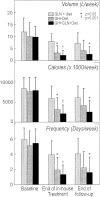Growth hormone, glutamine, and an optimal diet reduces parenteral nutrition in patients with short bowel syndrome: a prospective, randomized, placebo-controlled, double-blind clinical trial
- PMID: 16244538
- PMCID: PMC1409868
- DOI: 10.1097/01.sla.0000186479.53295.14
Growth hormone, glutamine, and an optimal diet reduces parenteral nutrition in patients with short bowel syndrome: a prospective, randomized, placebo-controlled, double-blind clinical trial
Abstract
Objective: To determine if growth hormone (GH) and glutamine (Gln) might allow for a reduction in parenteral nutrition (PN) in individuals with short bowel syndrome.
Background data: Following massive intestinal resection, patients frequently sustain severe nutrient malabsorption and are dependent on PN for life. GH treatment with or without Gln might allow for a reduction in PN.
Methods: A prospective, double-blind, randomized, placebo-controlled clinical trial performed in 41 adults dependent on PN. Following screening, patients were admitted to an in-house facility for 6 weeks. After 2 weeks of stabilization and dietary optimization, patients were randomized to one of 3 treatment arms (1:2:2 ratio): oral Gln (30 g/day) + GH placebo (control group, n = 9), Gln placebo + GH (0.1 mg/kg per day, n = 16), or Gln + GH (n = 16). Standard criteria based on clinical and laboratory measurements were followed to determine PN volume and content. After 4 weeks of treatment, patients were discharged and monitored; GH and GH placebo were discontinued, but the diet with Gln or Gln placebo was continued for 3 months.
Results: Patients receiving GH + Gln placebo + diet showed greater reductions in PN volume (5.9 +/- 3.8 L/wk, mean +/- SD), PN calories (4338 +/- 1858 calories/wk), and PN infusions (3 +/- 2 infusions/wk) than corresponding reductions in the Gln + diet group (3.8 +/- 2.4 L/wk; 2633 +/- 1341 calories/wk; 2 +/- 1 infusions/wk, P < 0.05). Patients who received GH + Gln + diet showed the greatest reductions (7.7 +/- 3.2 L/wk; 5751 +/- 2082 calories/wk; 4 +/- 1 infusions/wk, P < 0.001 versus Gln + diet). At the 3-month follow-up, only patients who had received GH + Gln + diet maintained significant reductions in PN (P < 0.005) compared with the Gln + diet.
Conclusions: Treatment with GH + diet or GH + Gln + diet initially permitted significantly more weaning from PN than Gln + diet. Only subjects receiving GH + Gln + diet maintained this effect for at least 3 months.
Figures
Similar articles
-
Are plasma citrulline and glutamine biomarkers of intestinal absorptive function in patients with short bowel syndrome?JPEN J Parenter Enteral Nutr. 2007 Jan-Feb;31(1):1-7. doi: 10.1177/014860710703100101. JPEN J Parenter Enteral Nutr. 2007. PMID: 17202433 Clinical Trial.
-
A new treatment for patients with short-bowel syndrome. Growth hormone, glutamine, and a modified diet.Ann Surg. 1995 Sep;222(3):243-54; discussion 254-5. doi: 10.1097/00000658-199509000-00003. Ann Surg. 1995. PMID: 7677455 Free PMC article. Clinical Trial.
-
The anabolic effects of recombinant human growth hormone and glutamine on parenterally fed, short bowel rats.World J Gastroenterol. 2002 Aug;8(4):752-7. doi: 10.3748/wjg.v8.i4.752. World J Gastroenterol. 2002. PMID: 12174391 Free PMC article.
-
Small bowel adaptation with growth hormone and glutamine after massive resection of rat's small bowel.Nutr Hosp. 1999 Mar-Apr;14(2):81-90. Nutr Hosp. 1999. PMID: 10364785 Review.
-
Strategies for parenteral nutrition weaning in adult patients with short bowel syndrome.J Clin Gastroenterol. 2006 May-Jun;40 Suppl 2:S94-8. doi: 10.1097/01.mcg.0000212679.14172.33. J Clin Gastroenterol. 2006. PMID: 16770168 Review.
Cited by
-
Schlafen 3 changes during rat intestinal maturation.Am J Surg. 2012 Nov;204(5):598-601. doi: 10.1016/j.amjsurg.2012.07.004. Epub 2012 Aug 17. Am J Surg. 2012. PMID: 22906252 Free PMC article.
-
Management and Complications of Short Bowel Syndrome: an Updated Review.Curr Gastroenterol Rep. 2016 Jul;18(7):40. doi: 10.1007/s11894-016-0511-3. Curr Gastroenterol Rep. 2016. PMID: 27324885 Review.
-
Update on clinical trials of growth factors and anabolic steroids in cachexia and wasting.Am J Clin Nutr. 2010 Apr;91(4):1143S-1147S. doi: 10.3945/ajcn.2010.28608E. Epub 2010 Feb 17. Am J Clin Nutr. 2010. PMID: 20164318 Free PMC article. Review.
-
The use of hormonal growth factors in the treatment of patients with short-bowel syndrome.Drugs. 2006;66(5):581-9. doi: 10.2165/00003495-200666050-00001. Drugs. 2006. PMID: 16620138 Review.
-
Reconnection surgery in adult post-operative short bowel syndrome < 100 cm: is colonic continuity sufficient to achieve enteral autonomy without autologous gastrointestinal reconstruction? Report from a single center and systematic review of literature.G Chir. 2017 Jul-Aug;38(4):163-175. doi: 10.11138/gchir/2017.38.4.163. G Chir. 2017. PMID: 29182898 Free PMC article.
References
-
- Gouttebel MC, Saint Aubert B, Colette C, et al. Intestinal adaptation in patients with short bowel syndrome: measurement by calcium absorption. Dig Dis Sci. 1989;34:709–715. - PubMed
-
- Messing B, Crenn P, Beau P, et al. Long-term survival and parenteral nutrition dependence in adult patients with the short bowel syndrome. Gastroenterology. 1999;117:1043–1050. - PubMed
-
- Drucker DJ. Epithelial cell growth and differentiation: I. Intestinal growth factors. Am J Physiol. 1997;273:G3–G6. - PubMed
-
- O'Dwyer ST, Smith RJ, Hwang TL, et al. Maintenance of small bowel mucosa with glutamine-enriched parenteral nutrition. JPEN. 1989;13:579–585. - PubMed
Publication types
MeSH terms
Substances
LinkOut - more resources
Full Text Sources



